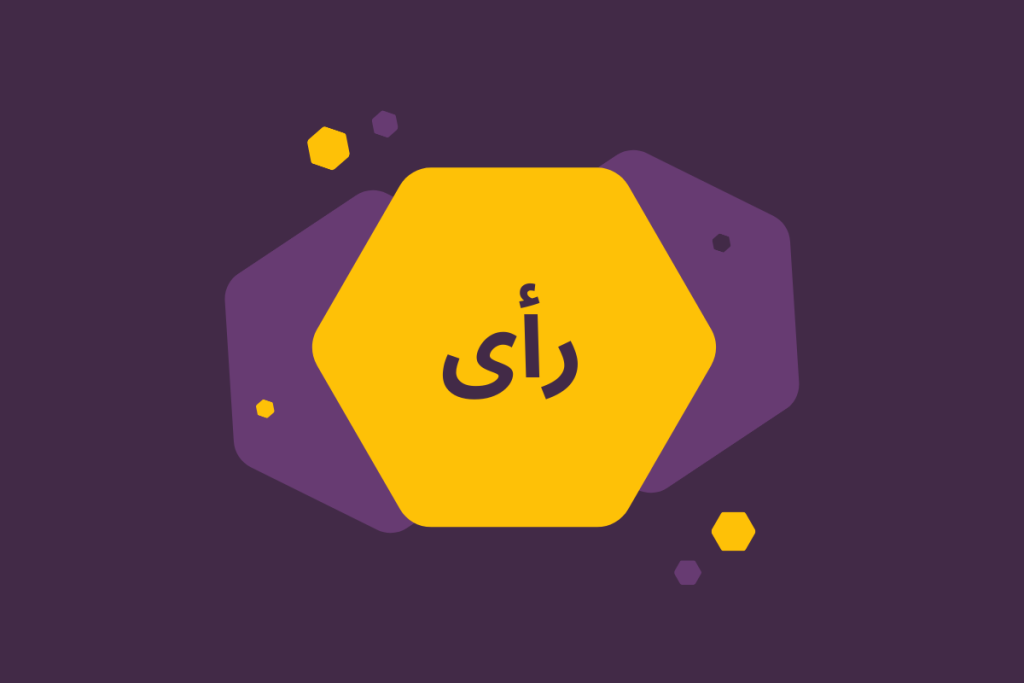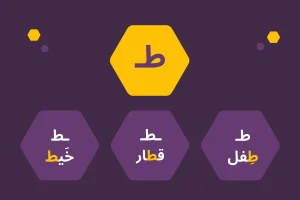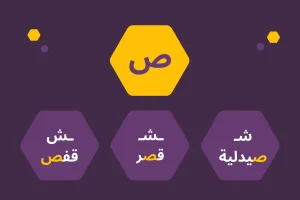
Verb of the Day
Raʼá
رَأَى
Welcome to Verb of the Day series, where we will learn about the meanings of various verbs in the Arabic language and the ways of their conjugation with pronouns in different verb tenses. We will also look at numerous examples from everyday life situations and we will have examples from key sources of Arabic and Islamic culture, such as the Holy Quran, Hadith and poetry.
We will begin our series with the verb “رَأَى” (Raʼá), which translates to “saw”
Main Meaning
To see with your eye
The verb means to see with the naked eye. For instance,
The father saw his son playing.
Raʼá alʼabu ibnahu yalʻabu
رَأَى الأَبُ اِبنَهُ يَلعَبُ
He saw the star in the sky.
Raʼá alnaajma fī alssamāʼi
رَأَى النَّجمَ في السَّماءِ
To give an opinion
It also denotes an individual’s perspective on a specific statement or opinion. In this sense, the verb means “to believe”. Look at the following example:
My father saw (believed) that this opinion was wrong.
Raʼá aby ann hadhā alraaʼya khāṭiʼun
رَأَى أَبي أَنّ هَذا الرَّأيَ خاطِئٌ
The father saw (believed) that the television was large, and the mother saw (believed) that it was suitable
Raʼá alʼabu ann altilfāza kabyrun waraʼati alʼummu annh munāsibun
رَأَى الأَبُ أَنّ التِلفازَ كَبيرٌ وَرَأَتِ الأُمُّ أَنّه مُناسِبٌ
Present and Past Conjugations
Now let’s look at how the verb رأى conjugates with pronouns in the past and present tenses.
English
Transcription
Arabic
I saw / I see
Anā raʼaytu – anā ará
أَنا رَأَيتُ / أَنا أَرى
We saw / We see
Naḥnu raʼaynā – naḥnu nará
نَحنُ رَأَينا / نَحنُ نَرى
He saw/ He sees
Huwa raʼá – huwa yará
هُوَ رَأَى / هُوَ يَرى
They saw/ They see (M/P)
Hum raʼaw – hum yarwna
هُم رَأَوا/ هُم يَرونَ
She saw/ She sees
Hya raʼt – hya tará
هيَ رَأت / هيَ تَرى
They saw/ They see (F/P)
Hunn raʼayna – hunn yarwna
هُنّ رَأَينَ/ هُنّ يَرونَ
You saw/ You see (M/S)
Anta rʼayta – anta tará
أنتَ رأَيتَ / أنتَ تَرى
You saw/ You see (M/P)
Antum raʼaytum – antum tarwna
أَنتُم رَأَيتُم/ أَنتُم تَرونَ
You saw/ You see (F/S)
Anti rʼyti – anti tryna
أنتِ رأيتِ / أنتِ ترينَ
You saw / You see (F/P)
Antunna raʼaytunna – antunn tarwna
أَنتُنَّ رَأَيتُنَّ / أَنتُنّ تَرونَ
You saw/ You see (D)
Antumā rʼytumā – antumā tryāni
أَنتُما رأيتُما/ أنتُما تريانِ
They saw / They see (M/D)
Humā rʼyā – humā yryān
هُما رأيا / هما يريان
*P: Plural S: Singular D: Dual F: Feminine M: Masculine
Verb in the Quran
Here is an example of the usage of the verb “رَأَى “(Raʼá) “saw” in the Holy Quran:
So when the night covered him [with darkness], he saw a star.
falmmā jann ʻalyhi alllaylu raʼá kawkaban
فَلَمَّا جَنَّ عَلَيْهِ اللَّيْلُ رَأَى كَوْكَبًا. ( الأنعام: 76 )
Verb in the Hadith
We can also find an example of the usage of the verb “رَأَى “(Raʼá) “saw” in the Hadith. Prophet Muhammad (PBUH) says:
This Hadith means: (Whoever amongst you sees an evil, he must change it with his hand.)
man raʼá minkum munkaran falyughayyrhu biyadih
(مَن رَأَى مِنكُم مُنكَرًا فَليُغَيّرهُ بِيَدِه ..)
Verb in Poetry
The verb رأى is also used in the following line of poetry:
رَأَيتُ الدّهرّ مُختَلِفًا يَدورُ فَلا حُزنٌ يَدومُ وَلا سُرورُ
Raʼaytu alddhrr mukhtalifan yadwru falā ḥuznun yadwmu walā surwru
This verse means the following: “I have seen time turn in varied ways; neither sorrow nor joy endures.”
It invites us to maintain a balanced perspective on life. When faced with challenges, we can find solace in knowing that difficult times will pass. Similarly, during moments of happiness, we should cherish them without becoming overly attached, understanding that they, too, are transient.
Of course, in this context, the verb رأى implies “observing” time and how it changes, rather than “seeing” it physically.
More Examples
I see the sun shining.
Anā ará alshaamsa mushriqtan
أَنا أَرى الشَّمسَ مُشرِقّةً
You see that the weather is suitable for camping.
Anta tará ann alṭṭqsa munāsibun liltaakhyymi
أَنتَ تَرى أَنّ الطّقسَ مُناسِبٌ لِلتَّخييمِ
She saw the teacher coming.
Hiya raʼat almuʻallimta qādimtan
هِيَ رَأَت المُعَلِّمةَ قادمةً
We saw the stars adorning the sky.
Raʼaynā alnnujwma tuzayyinu alsaamāʼ
رَأَينا النُّجومَ تُزَيِّنُ السَّماء
Did you see the news yesterday?
Hal raʼaytum nashrta alʼakhbāri albāriḥta?
هَل رَأَيتُم نَشرةَ الأَخبارِ البارِحةَ؟
Do you see the dress as appropriate?
Hal tarwna anaa alllibāsa munāsibun?
هل تَرونَ أنَّ اللِّباسَ مُناسِبٌ؟
Word Derivations
Furthermore, there are words derived from the same root of this verb, such as:
vision
Rāʼī
رُؤْيَةٌ
visible
marʼī
مَرْئِي
viewer
ruʼyatun
رَائِي
Similar Verbs
Lastly, there is another Arabic verb that carries the same meaning as the verb يرى “to see,” which is looking and watching somebody or an event for an extended period. In this situation, we translate رأى to ‘watch’ to convey the intended meaning. In Arabic too, the verb شاهد /Shāhada/ carries the same meaning.
Read the following examples and notice the similarity between رأى and شاهد:
Example 1
I saw the teacher driving the car
Raʼaytu almuʻallima yaqūdu alssayyārta
رَأَيتُ المُعَلِّمَ يَقُودُ السَّيَّارةَ
I watched the teacher driving the car
Shāhadtu almuʻallima yaqūdu alssayyārta
شاهَدتُ المُعَلِّمَ يَقُودُ السَّيَّارةَ
Example 2
We saw a useful program on TV
Raʼaynā fī alttilfāzi barnāmajan mufydan
رَأَينا في التِّلفازِ بَرنامَجًا مُفيدًا
We watched a useful program on TV
Shāhadnā fī alttilfāzi barnāmajan mufydan
شاهَدنا في التِّلفازِ بَرنامَجًا مُفيدًا
Conclusion
If you like this verb, go to Verb of the Day page to learn about other important Arabic verbs.
Finally, we would like to remind you to check our special planner that you can use to speed up your learning journey. In the planner, you will be given a rich 30-page worksheet accompanied by over 200 practical exercises and activities. It will help you back your acquired knowledge and newly learned language and push your learning journey forward with tons of practice opportunities.
You can also download the AlifBee app and begin your learning journey with a wealth of exercises designed to make learning Arabic engaging and effective. The app offers interactive lessons, quizzes, and activities that cater to all levels, ensuring a comprehensive and enjoyable experience.




